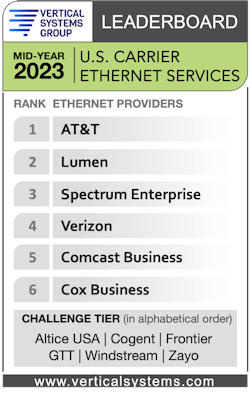Vertical Systems Group: AT&T overtakes Lumen as the top Ethernet provider
AT&T has regained its first place ranking on Vertical Systems Group’s U.S. Ethernet LEADERBOARD for mid-2023, surpassing Lumen Technologies.
The telco has built a sizeable war chest of assets to support its Ethernet service portfolio.
As of the end of the second quarter, AT&T Business lit 750,000 U.S. business buildings with fiber, enabling high-fiber connections to more than 3 million U.S. business customer locations. Also, over ten million business customer locations are on or within 1,000 feet of its fiber network.
However, AT&T did see some challenges in the second quarter as business segment revenues were $5.3 billion, down 5.6% year over year due to what AT&T said was lower demand for legacy voice and data services and product simplification, partly offset by growth in core connectivity services. Alternatively, Business Solutions wireless service revenues grew 9.1%.
Joining AT&T in the top ranking of VSG’s mid-2023 LEADERBOARD are Lumen, Spectrum Enterprise, Verizon, Comcast Business and Cox Business. Network providers must have four percent (4%) or more of the U.S. retail Ethernet services market to qualify for a rank on this LEADERBOARD.
Six companies gained a spot in the Challenge Tier segment: Altice USA, Cogent (including Sprint assets), Frontier, GTT, Windstream and Zayo. The Challenge Tier includes providers with between 1% and 4% share of the U.S. retail Ethernet market.
DIA, SD-WAN take charge
Ethernet port share growth was driven by two main factors: demand for DIA (Dedicated Internet/Cloud Access) and SD-WAN.
Driven by ongoing enterprise migration to Cloud services, Managed SD-WAN and SASE, and hybrid WANs, VSG said that DIA (Dedicated Internet/Cloud Access) accounted for the most new Ethernet service installations in the first half of 2023.
The research group noted that Ethernet Access to VPN installations is declining as MPLS customers transition to SD-WANs.
Rick Malone, principal of Vertical Systems Group, said the demand for dedicated internet access (DIA) and SD-WAN were the growth engines of Ethernet in the first half of 2023. “DIA connectivity for cloud computing and SD-WAN/SASE networks lifted U.S. Ethernet port growth in the first half of 2023,” he said.
Eyeing wavelengths, dark fiber
One of the latest growing market trends is the 100 Gigabit Ethernet connectivity demand. This comes as customers upgrade from lower-speed Ethernet services and consider wavelength or dark fiber service alternatives.
Wavelength circuits provide Layer 1 dedicated bidirectional gigabit-speed optical fiber connections between sites like a multi-site enterprise or a data center.
VSG noted in its year-end 2022 U.S. Wavelength Services LEADERBOARD the critical driver for wavelength services is expanding the U.S. base of wavelength circuits driven by double-digit growth for 100+ Gbps connections through 2027. Billable installations of 400+ Gbps services are also emerging as wavelength providers expand availability and roll out new solutions.
Customer demand for retail wavelength circuits continued to outpace wholesale deployments in 2022. This growth is due to what VSG said is the surge in gigabit bandwidth requirements from carriers, webscale network operators, and enterprises.
“Despite the resiliency of the Ethernet market, several providers are preparing for port reductions in the future as customers opt for alternative service technologies” like wavelength and dark fiber services, Malone said.
For related articles, visit the Business Topic Center.
For more information on high-speed transmission systems and suppliers, visit the Lightwave Buyer’s Guide.
To stay abreast of fiber network deployments, subscribe to Lightwave’s Service Providers and Datacom/Data Center newsletters.
About the Author
Sean Buckley
Sean is responsible for establishing and executing the editorial strategy of Lightwave across its website, email newsletters, events, and other information products.

